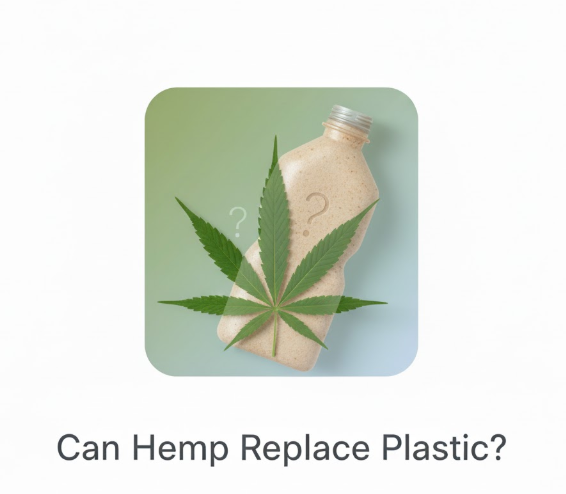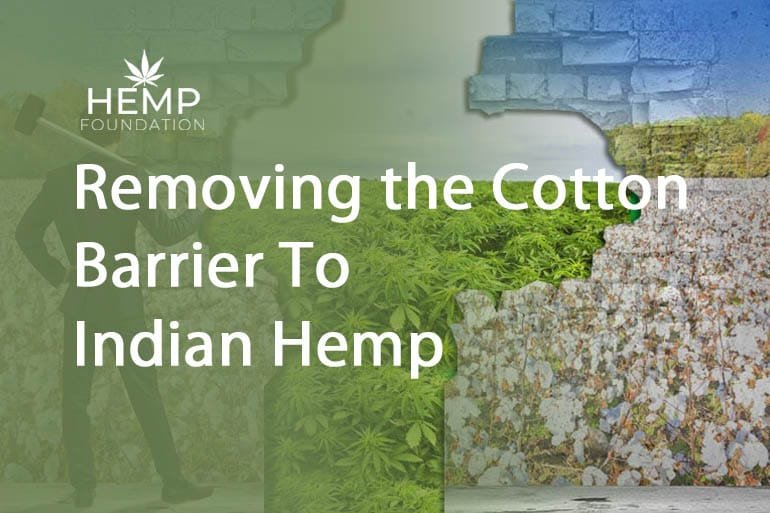Can Hemp Replace Plastic? What Science and Experts Say
A recent study has shown just how much the youth values sustainability.
Nearly three-quarters (73%) are willing to pay more, and 62% prefer to buy from sustainable brands. That obviously is a substantial segment of the market and makes it clear why retail brands need to engage in sustainable practices to meet the demands of their most important long-term customer base.
That is also why the hunt for real plastic alternatives has moved from “nice to have” to urgent.
Enter hemp bioplastic. It is not a hype or a TikTok trend but a practical and superior option.
But there’s always the big question: can hemp replace plastic at scale?
In this guide, I’ll try to explain:
- What hemp plastic actually is
- How it performs in real products
- Whether it’s sustainable at end of life
As an industry insider, I want to go beyond mere buzzwords and focus on evidence that shows how hemp can replace plastic.
Let’s dig in.
What Is Hemp Plastic and How Is It Made?
Before we talk about how hemp can replace plastics, let’s understand hemp bioplastics. Hemp bioplastics are made from the cellulose in hemp stalks.
Hemp stalks contain roughly 65–75% cellulose. That high cellulose content is the backbone of bioplastics. Here is an easy to understand explanation of how hemp stalks are turned into bioplastics:
1. Fiber Sourcing & Refinement
Raw hemp stalks are mechanically processed to separate the long, strong bast fibers from the woody core. These fibers are chemically treated to extract and purify cellulose.
2. Material Engineering
The pure cellulose is blended to create the final product material:
100% Bioplastic: The pure cellulose is processed directly, often with biodegradable plasticizers. This creates a fully moldable and compostable material.
High-Strength Composites: Cellulose fibers are mixed with a polymer bioplastic like PLA. This results in an incredibly strong, lightweight hemp composite.
3. Manufacturing & Scale
Manufacturers can easily integrate this hemp bioplastic into their established supply chains. The hemp composite is molded into its final product. The good news is that standard injection molding equipment already used in plastic manufacturing also works with hemp bioplastics.
Today, hemp bioplastics have found a wide variety of applications. The industrial hemp market is poised to rise from $7.75 billion in 2025 to $38 billion by 2035 which shows its terrific potential. Here is a partial list of its uses:
Industry | Applications |
Packaging | Single-use items (cutlery, plates, cups) Food containers Films and wraps Bags and pouches |
Automotive | Interior panels (dashboards, door panels) |
Consumer Goods & Electronics | Electronics casings (phones, laptops) Household items (furniture, kitchenware, toys) 3D printing filaments Sunglasses frames |
Construction | Hempcrete Panels and composites (wall panels, roofing tiles) Insulation, Pipes and plumbing |
Horticulture | Pots and trays Mulch film |
Hemp Plastic Performance & Strength
Hemp plastic is an excellent alternative to traditional plastics. It a unique combination of mechanical strength and environmental benefits and can be adapted for industrial use.
Let us look at how hemp plastic performs:
Tensile Strength
According to a 2024 study published in MDPI the average tensile strength for processed hemp fibers is approximately 475 ± 75 MPa (million pascals). Tensile strength is the maximum pulling force a material can withstand before tearing.
The table below shows a tensile strength comparison between hemp, steel and nylon.
Material | Typical Tensile Strength |
Hemp fiber | 400–1800 MPa |
Steel | 345–620 MPa (Hot-rolled steel) 500–2000 MPa (Stainless steel) |
Nylon | 60–85 MPa (For common types like Nylon 6) |
Please note –
- This strength varies greatly based on fiber diameter. Thinner hemp fibers showing much higher tensile strength.
- The average tensile strength of 475 ± 75 MPa is typical for processed hemp bundles used in composites.
- Individual hemp fibers can exceed steel’s tensile strength, and the strongest hemp fibers outperform the strongest steel.
Mechanical Strength
Mechanical strength is the ability to tolerate external forces without deforming. Here too hemp plastic also demonstrates superb results. The metrics however vary based on fiber content, composite material, and processing techniques.
Hemp fibers improve the strength of biodegradable plastics like PBAT and PLA and make them stronger and stiffer.
For example, treating the hemp fibers with silane can increase the strength gain.
One study reported a 45% increase in tensile strength in PBAT composites compared to 16% for untreated hemp.
Similarly, adding hemp to PLA plastic can make the material up to 52% stronger than pure PLA due to the robust chemical bond between the fiber and the plastic.
This combination of strength and low density is highly valued in the automotive industry. For instance, BMW used hemp-based materials in the i3 electric car’s interior panels to reduce weight.
Is Hemp Actually Carbon-Negative and Biodegradable?
Why is there a need to replace traditional plastics? After all, good old petroleum plastics are cheap and easily available.
The biggest reason is the overwhelming environmental and health concerns due to plastic pollution. On the other hand, hemp plastic is biodegradable and has a low carbon footprint. This makes it a sustainable alternative to traditional plastics.
Biodegradability
Petroleum plastics can persist for 400 –1,000 years. Biodegradable hemp plastic can break down easily:
It decomposes within 3–6 months in industrial compost and a year in soil.
A study has shown manila hemp bioplastic lost 80% of its strength after just 20 days of composting.
Carbon sequestration
Hemp absorbs between 8 and 15 tonnes of CO₂ per hectare per year. That is twice the rate of many forests. Hemp plantations can sequester hundreds of millions of tons of carbon annually and offset global warming.
Resource efficiency
Hemp grows in 3–4 months and requires far less water than cotton. It is also naturally resistant to many pests and grows densely. The yields per hectare up to four times greater than cotton.
In short:
- Hemp plastic decomposes cleanly
- Hemp cultivation supports soil health
- Use of hemp plastics cuts emissions
There is however a caveat attached to the above. True sustainability depends on proper composting and using genuinely biodegradable blends.
What Does The Research And Expert Community Actually Say?
The signal from the scientific community is positive to say the least:
- The journal Heliyon has called hemp “a very promising renewable resource.”
- A 2023 study from Western University in Canada found that hemp plastic can be made using normal factory machines and is just as strong, or even stronger, than regular plastic.
- According to Dr Darshil Shah from Cambridge University hemp outperforms trees in CO₂ capture and delivers an incredible scope for a better future.
From BMW’s engineers to startups like Ukhi, hemp plastics are already being put to good use in everyday manufacturing processes.
Frequently Asked Questions
Can hemp replace plastic in most products?
Yes it is possible to use hemp plastic alternatives in nearly every case. Hemp plastic is an ideal strong, durable, and biodegradable material for use in daily life and industry.
Is hemp plastic really 100% biodegradable?
Hemp plastic is fully biodegradable. It breaks down in 3 – 6 months if composted properly. But if conventional plastics have been added there is residue.
What are the key benefits of hemp bioplastic?
Hemp plastic is a sustainable alternative to petroleum based plastics. These are the key benefits:
Biodegradable – breaks down easily in a composting facility
Renewable – grows very quickly and harvested every six months
Carbon negative – draws in a lot of CO₂ and helps clear out greenhouse gases
How does hemp plastic compare to traditional plastic?
It is stronger, lighter and completely biodegradable unlike traditional plastics that linger on for centuries and poison the ecosystem.
Can plastic bags and bottles be made from hemp?
Hemp plastic can be molded into bags and bottles. It is injection molded, just like conventional plastic.
Vishal Vivek
Vishal Vivek is the Founder and CEO of Ukhi, a pioneering bio-materials company dedicated to ending plastic pollution by converting agricultural waste into high-performance compostable polymers. With a background in sustainable entrepreneurship and over a decade of technology experience, he leads Ukhi’s vision to create scalable, planet-positive material solutions. Previously, Vishal founded the Hemp Foundation, where he empowered more than 1,000 farmers and advanced sustainable livelihood initiatives. His work has been recognized through awards such as the HDFC Parivartan Grant and featured in leading publications like Forbes and Entrepreneur. Times Group recognized him as a legendary entrepreneur and published his biography in “I Did IT- Vol 2” alongside social pioneers like Bindeshwar Pathak (Sulabh International) and Anshu Gupta (Goonj). Vishal has authored more than 200 articles on sustainability and hemp, reflecting his deep expertise and advocacy for regenerative solutions. His commitment to grassroots impact led him to live in the remote mountains of Uttarakhand, where he immersed himself in the lives of marginal farmers, understanding their challenges and co-creating economic opportunities through hemp-based initiatives. A deeply passionate innovator, Vishal often draws inspiration from seemingly impossible achievements: “If Elon Musk can make rockets reusable, or Dashrath Manjhi can carve a path through a mountain with rudimentary tools, why can’t we eliminate the demon of single-use plastic while uplifting struggling farmers? We will make it happen—whatever it takes.” Ukhi is proud to be supported by premier institutions including IIT Guwahati, NSRCEL-IIM Bangalore, Indian School of Business (Hyderabad), Indian Council of Agricultural Research (ICAR Pusa), and the Indian Institute of Packaging. Vishal is committed to demonstrating that business can be a powerful catalyst for global environmental and social good. Connect with Vishal Vivek
Related Posts
Why the World needs a Consistent Cannabis Policy
What if drinking tea were illegal? Worse still, what if drinking a latter were legal, but a shot of
Removing the Cotton Barrier To Indian Hemp
Several conspiracy theories surround hemp. A variety of them proposes that certain companies and mag
Hemp Plastics Industry – Market Size and Industry Landscape. Can It Replace Fossil-based plastics? If yes, how Much?
Can you imagine a life without plastics? Perhaps not. Everything is made of plastic; from stuf



